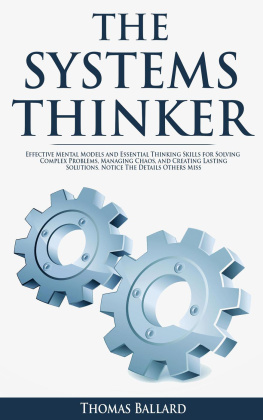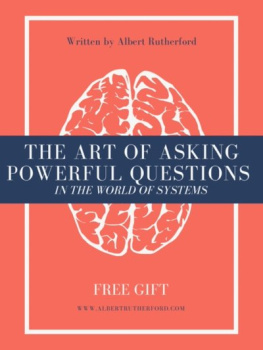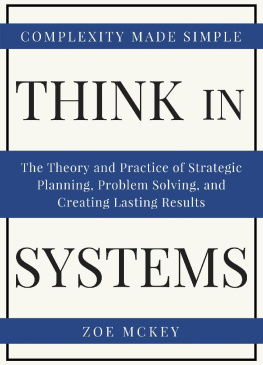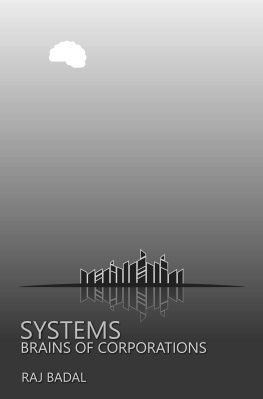The Art Of Thinking In Systems
Improve Your Logic, Think More Critically, And
Use Proven Systems To Solve Your Problems
- Strategic Planning For Everyday Life
Steven Schuster
steveschusterbooks@gmail.com
Copyright 2018 by Steven Schuster. All rights reserved.
No part of this publication may be reproduced, stored in a retrieval system, or transmitted in any form or by any means, electronic, mechanical, photocopying, recording, scanning or otherwise, except as permitted under Section 107 or 108 of the 1976 United States Copyright Act, without the prior written permission of the author.
Limit of Liability/ Disclaimer of Warranty: The author makes no representations or warranties with respect to the accuracy or completeness of the contents of this work and specifically disclaims all warranties, including without limitation warranties of fitness for a particular purpose. No warranty may be created or extended by sales or promotional materials. The advice and recipes contained herein may not be suitable for everyone. This work is sold with the understanding that the author is not engaged in rendering medical, legal or other professional advice or services. If professional assistance is required, the services of a competent professional person should be sought. The author shall not be liable for damages arising herefrom. The fact that an individual, organization of website is referred to in this work as a citation and/or potential source of further information does not mean that the author endorses the information the individual, organization to website may provide or recommendations they/it may make. Further, readers should be aware that Internet websites listed in this work might have changed or disappeared between when this work was written and when it is read.
For general information on the products and services or to obtain technical support, please contact the author.
Table Of Contents
Introduction
Would you like to think more complexly? Understand why certain things happen to you sometimes seemingly by chance, sometime seemingly by law? Or to become more productive finding shortcuts where no one else is looking? What about improving your relationships understanding why certain arguments truly arise? What would you think if I told you that you can achieve these things by working smarter, not harder? Ive yet to meet a person who wouldnt say Sign me up! I, too, want all of those things for my life. Im here to show you how it just might be possible with a shift in your thinking. A paradigm shift in the way you think about the world to systems thinking.
Everything in the world around us is part of a system. A system is a combination of both physical and abstract things, and how those things interact in relation to one another. Systems thinking is being able to examine and analyze ourselves and the things around us with the express purpose of being able to improve upon them. It requires us to be more observant and aware of the things that impact us, in both big and small ways, and then be willing to take the necessary steps to change the obstacles in our path.
Your whole life is a system. It is made up of a lot of parts that interact with one another. First, you have physical components like your body and the things around you that you can touch: your house, car, clothes, cell phone, books, etc. Then we add in the abstract pieces to the puzzle: your beliefs, convictions, ideas, and values everything that defines your core sense of self and makes you who you are on the inside. Finally, we incorporate the things in your life which you do not have complete control over, like your relationships, your health, and your finances. All of these things work together to make up the system of your life.
In systems thinking, it is often helpful to make diagrams so that we can visualize and better understand how things influence one another and work together within the whole system. It is only then that we really begin to be able to break down and analyze our systems so that we can improve them. Systems thinking is not something that will happen overnight and immediately come easily. It is a way of looking at the world that will take time to develop.
Lets start by thinking of your life as a system. When you begin to diagram, map, or list the components of your life as a system, begin by thinking of the people you encounter and the things you do nearly every day, as those will have a great impact on your life system. Your list may begin to take shape like this:
While you would be off to a good start, the list of your life as a system would be nowhere near complete (although that is all many outside observers may assume your list includes). You would need to add many more components to it, such as:
Now the combination of the two lists would be much closer to an accurate representation of a life system, but it is by no means an exhaustive list. Everyones life system will be unique.
Once you have drawn, written, or mapped out your list, you are now ready to start analyzing it. The beauty now is that you are more aware of the things that are impacting the system of your life. You are tuned in to how you are spending your time, and whether there are improvements that can be made to increase your productivity and help you achieve your goals. You can be more cognizant of the ways in which the parts of your life system interact with one another and impact your life. You can begin to make the kinds of positive changes that you would perhaps never even have realized you needed without shifting the way you look at the world to systems thinking.
Systems thinking is, at its heart, looking at problems in a way we havent before. It is a realization that everything is interconnected, and we should look at things as a whole rather than just a group of independent parts. Systems thinking means looking at the big picture first, then digging in deeper to examine its parts and focusing on the relationships between them. It is a supportive framework that helps you develop habits in your mind. Those habits give you feelings of strength and power that make you understand you have the ability to tackle even the most complex problems and affect positive change.











